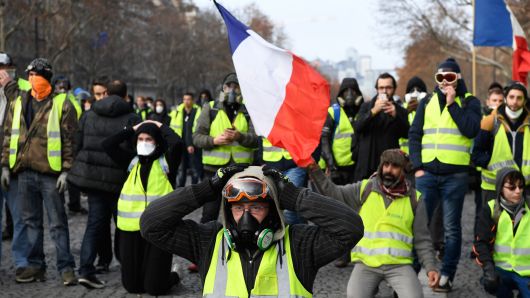Although the recent attack on a Christmas market in Strasbourg, France, has sapped some of the energy from the Yellow Vest protests, the root causes of French voters' discontent remain. At issue is not the need for reform, but rather the costs – and who should bear them.
The terrorist attack on a Christmas market in Strasbourg, France, on December 11 came after a month in which the “Yellow Vest” protests in Paris and other cities dominated international headlines. French police have since tracked down and killed the attacker in a shootout, and an old law of politics holds that the French will now rally behind President Emmanuel Macron – at least for the time being.
That is what happened after the attacks on the offices of Charlie Hebdo in 2015, when then-President Francois Hollande’s declining popularity was momentarily reversed. It also helps to explain how Vladimir Putin, previously an unknown entity, cemented his power in Russia following a series of bombings in 1999. Of course, in that case, investigative journalists have marshaled ample evidence to suggest that the government orchestrated the attacks to bolster its public support.
Although the Yellow Vests’ protests continue, tempers have cooled, providing a respite to Macron. But the movement’s socioeconomic roots remain. As anyone remotely familiar with French history knows, the competing forces of revolution and Bonapartism have long driven political outcomes. Macron owes his presidency to the latter. The French were attracted to the young reformer’s European triumphalism, not because they are particularly fond of the European Union (they aren’t), but because it seemed to augur a return of French imperial grandeur.
But it didn’t take long for the specter of revolution to return. Clearly, Macron misunderstood his own success. He was wrong to assume that French voters elected him to reform the EU. Though the French yearn for national greatness, they abhor economic pauperization in equal measure. Macron should have directed his attention to the latter issue. Instead, he launched a series of reforms that stoked the resentment of the masses.
Owing to his elitist self-presentation and personal background, Macron already looked like a representative of the rich. But he made matters worse by leading his reform efforts with labor-market deregulation and a reduction of the wealth tax. When he introduced a new tax on diesel fuel in the name of reducing carbon-dioxide emissions, struggling French commuters saw it as a personal affront.
Were we still living in the twentieth century, the fact that an ecological fuel tax prompted people to don yellow vests (which all motorists in France are required to carry in their vehicles) and take to the streets would not be particularly remarkable. But in 2018, it is highly significant.
Both symbolically and practically, the widespread backlash against the proposed fuel tax frustrates necessary and urgent efforts to combat global warming. But no longer can we assume that anyone who opposes green reforms is a climate-change denier, and therefore greedy, an idiot, or both. Even if everyone accepted the need to reduce greenhouse-gas emissions, that would not resolve the plight of workers who can barely make ends meet.
The Yellow Vests are primarily from the lower middle and working classes, rather than from the very bottom of the social ladder. Most are neither unemployed nor climate-change deniers, but they vehemently oppose a tax that they believe they cannot afford to pay. Many belong to the growing cohort of “working poor” – the “precariat” who have no choice but to accept low-wage positions in which they are often overworked and insecure. And because they are not unemployed, they and their problems are easily overlooked by French elites.
In France, unemployment itself is high (around 9%), and thus hard to ignore. But when one adds the growing precariat, one can see that the country has a serious problem on its hands. And France is hardly alone among advanced economies.
Economists estimate that it will cost France €500 ($573) per person per year to meet its emissions-reduction obligations under the 2015 Paris climate accord. That’s a lot, especially given that disposable household income grew by just 8% between 2007 and 2017, almost none of which accrued to those from which the Yellow Vests draw the bulk of their support.
Moreover, the economic insecurities that gave rise to the Yellow Vests are compounded by social fragmentation and geographic diffusion. As a result of deindustrialization, people with similar interests are less concentrated in large factory communities; and as a result of globalization, unskilled workers have been priced out of large cities. Almost by definition, those who live in Paris have nothing to fear, because they are the high-earning beneficiaries of globalization. But for everyone else, both work and participation in civic life requires commuting over some distance.
That is why the proposed fuel tax hits so close to home, and why the yellow vest has become such a potent and visible symbol. Most likely, it will be with us for some time to come.
Sławomir Sierakowski, the founder of the Krytyka Polityczna movement, is Director of the Institute for Advanced Study in Warsaw and a fellow at the Robert Bosch Academy in Berlin.
Read the original article on project-syndicate.org.
More about: Yellowvests
















































